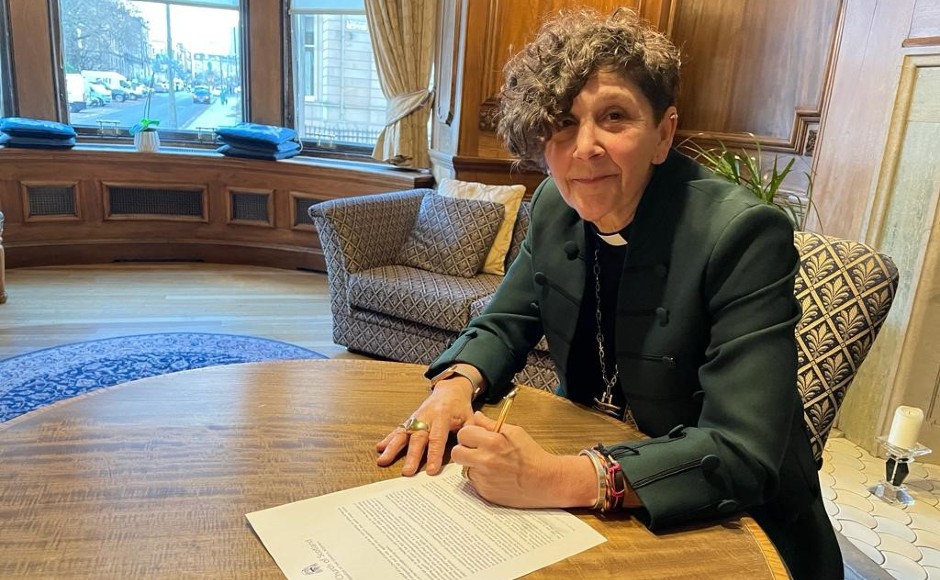Scottish MPs urged to reject controversial Rwanda Bill
Scottish MPs have been urged to resist passing the Safety of Rwanda (Asylum and Immigration) Bill and to vote against any amendments that would create further restrictions on the lives of people seeking asylum.
The call was made by Rt Rev Sally Foster-Fulton, Moderator of the General Assembly, ahead of two days of debate on the proposed legislation in the House of Commons today and tomorrow.
The proposed bill seeks to declare Rwanda a safe country, and would allow for the deportation of people seeking asylum.

But the Moderator has told Scotland's 59 MPs it will only lead to "more detentions, more deportations and an ongoing environment of hostility and mistrust".
The legislation has been put forward by the UK Government in the face of a Supreme Court ruling that deemed the policy unlawful due to the serious risk of refoulement meaning they could be at risk of persecution if forcibly returned.
In a letter to MPs, Mrs Foster-Fulton wrote: "People who have experienced persecution in their home countries would face a real threat of being returned to the site of their abuse, in a clear breach of their human rights.
"This was not a decision the Supreme Court reached lightly but on the basis of a lengthy hearing and thousands of pages of evidence.
"The court was clear that there is a real and serious risk.
Fairness and rule of law
"We are appalled that instead of responding to the ruling by addressing the material concerns raised, the UK Government is instead rushing through legislation that would instruct courts to ignore these considerations and continue with the unsafe deportations.
"This would disapply the human rights of vulnerable people fleeing persecution, ignoring our commitments under international law."
Mrs Foster-Fulton said the UK is a nation that prides itself on its commitment to fairness and the rule of law.
She continued: "We have built a reputation as a world leader when it comes to upholding and championing human rights.
"This bill threatens to destroy that reputation, reducing our ability to speak with any credibility on injustices and human rights abuses across the world.
"It also sets a worrying precedent that fundamental human rights can be eroded and denied to some."
Mrs Foster-Fulton said the effects of the controversial policy are already being felt throughout communities.
"People in our churches are expressing fear and anxiety, scared that they will be deported to a country they have no ties to, far from the communities they have come to call home," she wrote.
"Instead of beginning new and fruitful lives, something they are desperate to do, people are stuck in a place of uncertainty.
"It is devastating to see our friends and neighbours going through such avoidable distress.
"The UK country is proud of its Christian heritage and of the common values held across our faith traditions.
"Central among those values is hospitality and the call to welcome others into our communities."
Hostility and mistrust
Mrs Foster-Fulton said the story of the birth of Jesus Christ was at the forefront of people's minds in churches just a few weeks ago.
"It is the story of a young family who found shelter in a borrowed stable, before themselves having to flee as refugees," she wrote.
"Our faith compels us to advocate for a fair and just system that shows respect to all of God's children, regardless of where they were born or what their immigration status is.
"We urge you to resist this bill and any amendments that will further restrict the rights of asylum seekers.
"This legislation will only lead to more detentions, more deportations, and an ongoing environment of hostility and mistrust.
"Let us instead direct our focus on solutions that support refugees and asylum seekers many of whom are fleeing persecution and war in countries like Afghanistan, Iran, Syria and Ethiopia.
"They are entitled to seek a place of safety and the Church, in common with many charities, is already working closely with people who have fled desperate situations.
"We want to play a part in fostering improved integration, mutual respect, and the building of healthy communities which respects the rights of refugees and protects human rights for all."
Scotland's 59 MPs - 43 (SNP), 7 (Scottish Conservatives), 4 (Scottish Liberal Democrats), 2 (Alba Party), 2 (Scottish Labour), 1, (Independent).